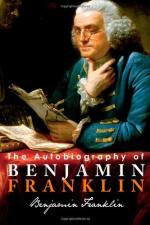|
This section contains 428 words (approx. 2 pages at 400 words per page) |

|
The Autobiography of Benjamin Franklin Summary & Study Guide Description
The Autobiography of Benjamin Franklin Summary & Study Guide includes comprehensive information and analysis to help you understand the book. This study guide contains the following sections:
This detailed literature summary also contains Bibliography and a Free Quiz on The Autobiography of Benjamin Franklin by Benjamin Franklin.
The Autobiography of Benjamin Franklin is a blueprint for the prototypical American, chronicling Benjamin Franklin's life as a printer, diplomat, statesman, patriot, scientist, inventor, and writer. Published posthumously in various forms over several years, first in French and then in English, Franklin's autobiography is a literary achievement worthy of the epic U.S. founding father. Franklin originally intended the document of his life and works to be for the sole use and enjoyment of his son, William. The first part, written in 1771, addresses his eldest child, but parts 2-4, written in 1784, 1788, and 1790, reflect its subject's hope that the book would find a wider audience, for the benefit of mankind. Franklin writes,
Having emerg'd from the Poverty and Obscurity in which I was born and bred, to a State of Affluence and some Degree of Reputation in the World, and having gone so far thro' Life with a considerable Share of Felicity, the conducing Means I made use of, which with the Blessing of God so well succeeded, my Posterity may like to know, as they may find some of them suitable to their own Situations, and therefore fit to be imitated.
As much a historical account of eighteenth-century America as a guide to being virtuous, The Autobiography of Benjamin Franklin follows in the tradition of "conduct books" made popular by statesmen, soldiers, and noblemen before Franklin. His straightforward, no-nonsense writing style reveals much about the man who readily admits "that were it offer'd to my Choice, I should have no Objection to a Repetition of the same Life from its Beginning." Much of Franklin's contentment in life lies in his striving to achieve moral perfection. His father planted the seed of that goal early in the author's life; he approached the project with scientific clarity later. Of his father, Franklin writes,
I remember well his being frequently visited by leading People, who consulted him for his Opinion in Affairs of the Town or of the Church he belong'd to and show'd a good deal of Respect for his Judgment and Advice. He was also much consulted by private Persons about their Affairs when any Difficulty occur'd, and frequently chosen an Arbitrator between contending Parties. At his Table he lik'd to have as often as he could, some sensible Friend or Neighbour, to converse with, and always took care to start some ingenious or useful Topic for Discourse, which might tend to improve the Minds of his Children. By this means he turn'd our Attention to what was good, just, and prudent in the Conduct of Life.
Read more from the Study Guide
|
This section contains 428 words (approx. 2 pages at 400 words per page) |

|



